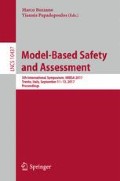Abstract
In the effort to develop critical systems, taking account of failure modes is of vital importance. However, when systems fail (even in a manner previously determined as acceptable), a lot of the invariants that hold in the case of nominal behaviour also fail. A technique is proposed that permits the inclusion of the strong invariants of nominal behaviour alongside the provisions for degraded behaviour in an inclusive formal system model. The faulty system model is derived from the nominal one via fault injection, and the nominal and faulty system models are related via a formal retrenchment step. Manipulation of the retrenchment data permits the inclusion of the stronger invariants, which remain provable when faults are disabled in a generic manner in the faulty model, thus increasing confidence in the overall system design. The details are developed in Event-B, and the concept is illustrated using a toy switching example.
Access this chapter
Tax calculation will be finalised at checkout
Purchases are for personal use only
Notes
- 1.
Of course, in reality, the fault portfolio is contemplated from the earliest stages of development, but we do not include any failure modes in the early stages of formal modelling.
- 2.
The generalised kind of guard used in retrenchment is typically referred to as the WITHIN clause in work on retrenchment.
- 3.
We write ‘non-refining’ in quotes because we have carefully defined the joint invariants to be oblivious to the faulty behaviour.
References
Abrial, J.R.: Modeling in Event-B: System and Software Engineering. Cambridge University Press, Cambridge (2010)
Abrial, J.R., Butler, M., Hallerstede, S., Hoang, T., Mehta, F., Voisin, L.: Rodin: an open toolset for modelling and reasoning in event-b. Int. J. Soft. Tools Tech. Trans. 12(6), 447–466 (2010)
ADVANCE: European Project ADVANCE. IST-287563. http://www.advance-ict.eu/
Back, R.J.R., Sere, K.: Stepwise refinement of action systems. In: Snepscheut, J.L.A. (ed.) MPC 1989. LNCS, vol. 375, pp. 115–138. Springer, Heidelberg (1989). doi:10.1007/3-540-51305-1_7
Back, R.J.R., Wright, J.: Trace refinement of action systems. In: Jonsson, B., Parrow, J. (eds.) CONCUR 1994. LNCS, vol. 836, pp. 367–384. Springer, Heidelberg (1994). doi:10.1007/978-3-540-48654-1_28
Back, R., Kurki-Suonio, R.: Decentralisation of process nets with centralised control. In: 2nd ACM SIGACT-SIGOPS Symposium on PODC, pp. 131–142. ACM (1983)
Back, R., Sere, K.: Superposition refinement of reactive systems. Form. Asp. Comp. 8(3), 324–346 (1996)
Banach, R.: A deidealisation semantics for KAOS. In: Lencastre, M. (ed.) Proceedings of the ACM SAC 2010 (RE track), pp. 267–274. ACM (2010)
Banach, R., Bozzano, M.: The mechanical generation of fault trees for reactive systems via retrenchment I: combinational circuits. Form. Asp. Comp. 25, 573–607 (2013)
Banach, R., Bozzano, M.: The mechanical generation of fault trees for reactive systems via retrenchment II: clocked and feedback circuits. Form. Asp. Comp. 25, 609–657 (2013)
Banach, R., Jeske, C.: Retrenchment and refinement interworking: the tower theorems. Math. Struct. Comput. Sci. 25, 135–202 (2015)
Banach, R., Jeske, C., Poppleton, M.: Composition mechanisms for retrenchment. J. Log. Alg. Program. 75, 209–229 (2008)
Banach, R., Poppleton, M., Jeske, C., Stepney, S.: Engineering and theoretical underpinnings of retrenchment. Sci. Comput. Program. 67, 301–329 (2007)
Beyer, D., Henzinger, T.A., Majumdar, R., Rybalchenko, A.: Invariant synthesis for combined theories. In: Cook, B., Podelski, A. (eds.) VMCAI 2007. LNCS, vol. 4349, pp. 378–394. Springer, Heidelberg (2007). doi:10.1007/978-3-540-69738-1_27
Bittner, B., Bozzano, M., Cavada, R., Cimatti, A., Gario, M., Griggio, A., Mattarei, C., Micheli, A., Zampedri, G.: The xSAP safety analysis platform. In: Chechik, M., Raskin, J.-F. (eds.) TACAS 2016. LNCS, vol. 9636, pp. 533–539. Springer, Heidelberg (2016). doi:10.1007/978-3-662-49674-9_31
Bozzano, M., Villafiorita, A.: Design and Safety Assessment of Critical Systems. CRC Press (Taylor and Francis), an Auerbach Book, Boca Raton (2010)
DEPLOY: European Project DEPLOY. IST-511599. http://www.deploy-project.eu/
Donaldson, A.F., Haller, L., Kroening, D., Rümmer, P.: Software verification using k-induction. In: Yahav, E. (ed.) SAS 2011. LNCS, vol. 6887, pp. 351–368. Springer, Heidelberg (2011). doi:10.1007/978-3-642-23702-7_26
Furia, C.A., Meyer, B.: Inferring loop invariants using postconditions. In: Blass, A., Dershowitz, N., Reisig, W. (eds.) Fields of Logic and Computation. LNCS, vol. 6300, pp. 277–300. Springer, Heidelberg (2010). doi:10.1007/978-3-642-15025-8_15
Ghilardi, S., Ranise, S.: Goal-directed invariant synthesis for model checking modulo theories. In: Giese, M., Waaler, A. (eds.) TABLEAUX 2009. LNCS, vol. 5607, pp. 173–188. Springer, Heidelberg (2009). doi:10.1007/978-3-642-02716-1_14
van Lamsweerde, A.: Requirements Engineering: From System Goals to UML Models to Software Specifications. Wiley, Chichester (2009)
Letier, E.: Reasoning about Agents in Goal-Oriented Requirements Engineering. Ph.D. thesis, Dépt. Ingénierie Informatique, Université Catholique de Louvain (2001)
Qin, S., He, G., Luo, C., Chin, W.N.: Loop invariant synthesis in a combined domain. In: Dong, J.S., Zhu, H. (eds.) ICFEM 2010. LNCS, vol. 6447, pp. 468–484. Springer, Heidelberg (2010). doi:10.1007/978-3-642-16901-4_31
RODIN: European Project RODIN (Rigorous Open Development for Complex Systems) IST-511599. http://rodin.cs.ncl.ac.uk/
Sekerinski, E., Sere, K.: Program Development by Refinement: Case Studies Using the B-Method. Springer, London (1998)
Voisin, L., Abrial, J.R.: The rodin platform has turned ten. In: Ait Ameur, Y., Schewe, K.D. (eds.) ABZ 2014. LNCS, vol. 8847, pp. 1–8. Springer, Heidelberg (2014). doi:10.1007/978-3-662-43652-3_1
Wahl, T.: The \(k\)-induction principle. http://www.ccs.neu.edu/home/wahl/Publications/k-induction.pdf
Author information
Authors and Affiliations
Corresponding author
Editor information
Editors and Affiliations
Rights and permissions
Copyright information
© 2017 Springer International Publishing AG
About this paper
Cite this paper
Banach, R. (2017). Invariant Management in the Presence of Failures. In: Bozzano, M., Papadopoulos, Y. (eds) Model-Based Safety and Assessment. IMBSA 2017. Lecture Notes in Computer Science(), vol 10437. Springer, Cham. https://doi.org/10.1007/978-3-319-64119-5_8
Download citation
DOI: https://doi.org/10.1007/978-3-319-64119-5_8
Published:
Publisher Name: Springer, Cham
Print ISBN: 978-3-319-64118-8
Online ISBN: 978-3-319-64119-5
eBook Packages: Computer ScienceComputer Science (R0)

